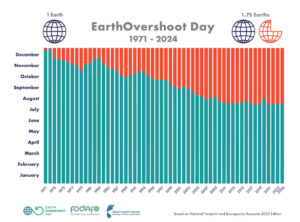Earth Overshoot Day is a different date each year, and for 2024 it falls on 1st August. That means that from 1st January to 1st August, collectively we have used as much from nature as the planet’s ecosystems can renew during this entire year – that’s according to the latest calculations by Global Footprint Network. So in just seven months, humanity has used what Earth takes 12 months to regenerate. And after today, the remainder of the year corresponds to global overshoot.
How Is Earth Overshoot Day calculated?
It’s calculated by dividing the planet’s biocapacity (the amount of ecological resources Earth is able to generate that year) by humanity’s Ecological Footprint (humanity’s demand for that year) and multiplying by 365, the number of days in a year. Or if it’s a leap year like 2024, then that would be 366 days.
In 1971, Earth Overshoot Day was on 25th December, but since 2005 the date has consistently fallen in August.

How Can We Help To #MoveTheDate?
The people at the Global Footprint Network naturally want to buck the trend on that graph, with an Earth Overshoot Day that falls later in the year. “Individuals have the power to better their homes and communities. The greatest potential for large-scale impact, however, lies with governments and businesses who align their policies and strategies with the reality of our finite planet,” they explain.
“More precisely, immense #PowerOfPossibility can be found in the countless existing solutions that can be implemented at scale. With them, we can make ourselves more resilient and #MoveTheDate of Earth Overshoot Day.”
Their Power of Possibility platform highlights many ways we can improve our resource security in five key areas: healthy planet, cities, energy, food and population.
Here are some easy-to-digest examples of how we can make change happen:
- Reforesting 350 million hectares of forest would move the date of Earth Overshoot Day by eight days.
- Reducing the carbon component of humanity’s Ecological Footprint by 50% would move Earth Overshoot Day by 93 days.
- Existing off-the-shelf, commercial energy-efficiency technologies for buildings, industrial processes and electricity production could move Earth Overshoot Day by at least 21 days, without any loss in productivity or comfort.
- If we cut food waste in half worldwide, we would move it by 13 days.

How Can We Reduce Food Waste?
Did you know that half of the Earth’s biocapacity is used to feed us? And, in the UK alone, we waste approximately 9.5 million tonnes of food every year.
Here are some top tips on what you can do to reduce your food waste and become more sustainable:
- Store food correctly. This will make your food last longer, so check the packaging for instructions or Google if you’re not sure.
- Your freezer’s your friend. Whether it’s for leftovers, half a loaf of bread or about-to-turn vegetables, your freezer is the perfect way to reduce food waste.
- Use a compost bin. Pop vegetable waste, egg shells and coffee grounds into your compost bin!
- Think about the biggest culprits. What do you throw away the most? If it’s fresh herbs, freeze them for future stews or curries. If it’s milk, freeze in ice cube trays.
- Revive vegetables. Bendy carrots can be good-as-new if you place them in cold water in your fridge. The same works for salad leaves – simply run ice-cold water over them in a colander.
- Take a measured approach. Always shop with a list so you only buy what you need, and measure foods such as pasta and rice so you don’t overdo it.
Find out more about Earth Overshoot Day and consider how you can make a difference.